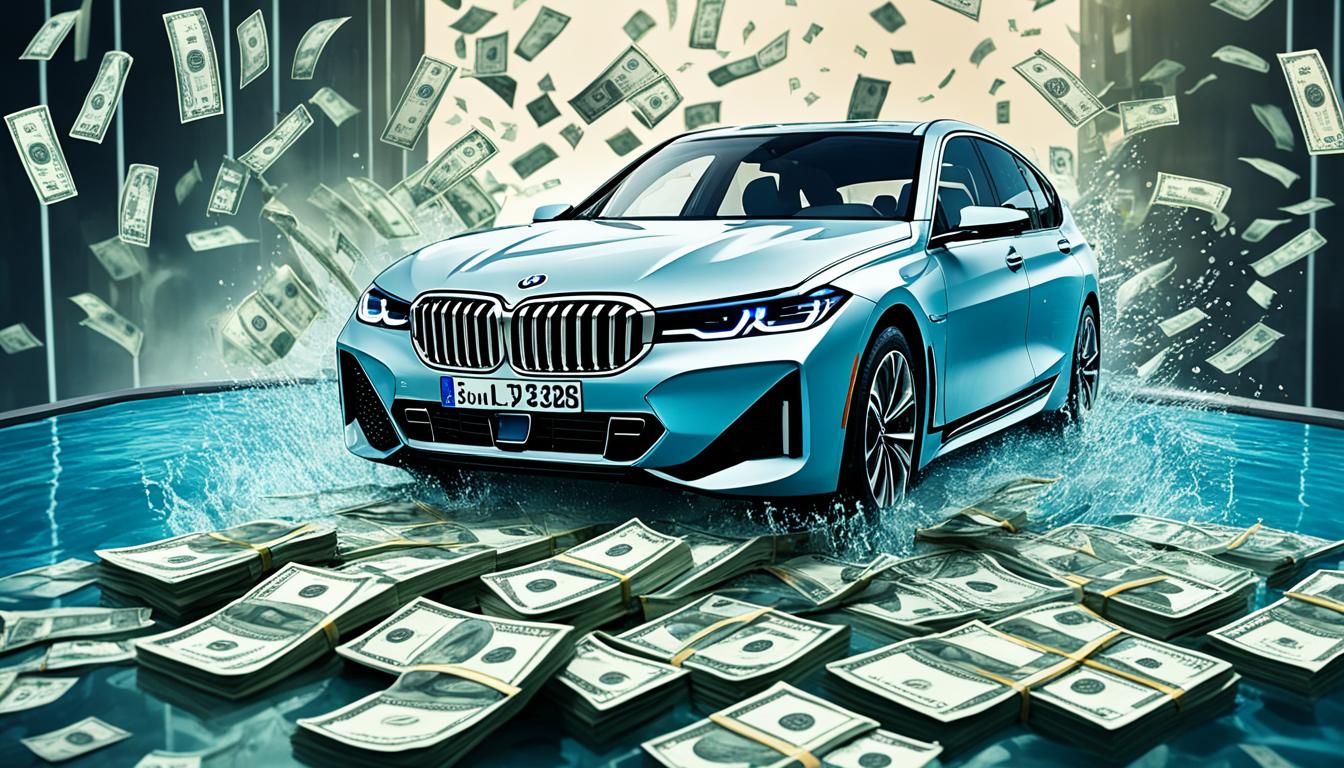The luxury EV market is abuzz with the introduction of the BMW i7, a model that heralds the latest technological advancements while continuing the legacy of the esteemed 7 Series. In a sector where value retention is key and BMW i7 depreciation is observed with a discerning eye, understanding the BMW i7 depreciation rate is not just for market analysts but also for savvy consumers evaluating the BMW i7 resale value. Will the BMW i7 set a new precedent in the electric era of luxury automobiles, or will it follow the historical depreciation trends that its predecessors could not evade? This section casts light on the depreciation rates of this exquisite automotive creation and its standing in the competitive luxury EV market.
Key Takeaways
- Insight into the BMW i7’s depreciation rate in relation to the luxury EV market.
- Analysis of the BMW i7’s potential in breaking historical depreciation trends of the luxury 7 Series.
- Understanding the factors that influence the BMW i7 resale value, critical for informed buyers.
- Assessment of BMW i7 against the backdrop of value retention benchmarks in luxury electric vehicles.
- Exploration of the delicate balance between innovation and its impact on the BMW i7’s market value.
The Story Behind Luxury Car Depreciation
The iconic BMW 7 Series has long been synonymous with luxury and technological innovation within the automotive industry. Yet, despite its pioneering design and performance, the series is not immune to the effects of depreciation in the luxury car market. As we turn our focus to the latest addition in this illustrious lineup, the BMW i7, we begin to unravel the complex narrative of depreciation that has marked the BMW 7 series history, and explore how it may impact the BMW i7 second-hand value over time.
Understanding the 7 Series Legacy
Tracing the roots of the BMW 7 Series reveals a legacy of luxury infused with cutting-edge technology, a combination aimed at delivering an unparalleled driving experience. However, even with its acclaimed status, the depreciation of this prestigious model highlights a contentious issue within the luxury automotive space. It is essential to explore the legacy of the 7 Series to understand the factors that may influence the trajectory of the BMW i7 value over time.
Factors Influencing BMW i7 Depreciation
Several elements are at play in the depreciation of high-end vehicles like the BMW 7 Series, which will undoubtedly affect the BMW i7’s positioning in the second-hand luxury car market. These factors range from technological advancements, cost of ownership, market demand, to shifting consumer preferences. A closer examination of these can offer predictive insights into the future behaviour of BMW i7 value over time.
| Factor | Influence on Depreciation | Relevance to BMW i7 |
|---|---|---|
| Technological Advancements | May lead to quicker obsolescence, affecting resale value. | High, due to rapid evolution in EV tech. |
| Market Demand | Popularity and demand can stabilize value retention. | Moderate, contingent on adoption rates of EVs. |
| Cost of Ownership | High maintenance and repair costs can deter buyers. | Significant, considering premium EV servicing costs. |
| Consumer Preferences | Shifting towards eco-friendly options may enhance value. | Substantial, as the i7 aligns with sustainability trends. |
BMW i7 Depreciation
When examining the prestige of the BMW brand, particularly the 7 Series, the conversation often turns to the vehicle’s luxury and innovation. Yet, when luxury intersects with the financial reality of depreciation, the BMW i7 enters the spotlight. Prospective buyers and industry analysts alike are closely monitoring the BMW i7 price drop to gauge how well this electric luxury sedan can retain its value compared to its predecessors and rivals.
The concept of car depreciation is not new, but the factors influencing the decrease in value of luxury cars are multifaceted. In particular, the depreciation comparison between electric vehicles (EVs) and their internal combustion counterparts presents a dynamic outlook for potential buyers. To provide a comprehensive BMW i7 depreciation analysis, it is essential to look at historical trends while anticipating the future impact of electric mobility on auto value retention.
Depreciation Factors for the BMW i7: Several variables will likely impact the resale value of the BMW i7. Historical depreciation patterns of luxury vehicles suggest a sharp decline, often steeper than that of more economically priced cars. This eagerness to emphasize this aspect hints at the complex narrative surrounding the evolution of such a high-end model in the bustling EV market. The question remains: will the BMW i7 break the mold, or will it follow the shadow cast by the seven generations preceding it?
Addressing concerns regarding the electric revolution, the BMW i7’s cutting-edge technology and electric propulsion could either mitigate depreciation or contribute to an accelerated rate due to the rapid advancement of EV technologies. As we delve deeper into the specifics, our understanding of the factors affecting the BMW i7 depreciation evolves, blending historical insights with contemporary market shifts.
Despite its allure and advanced features, the luxury sedan market often faces the sobering force of value reduction over time—a trend that prospective BMW i7 owners are cautiously optimistic may change with this latest iteration.
A preliminary analysis of the known variables shaping the BMW i7’s depreciation analysis indicates that while luxury vehicles are subject to market forces, the unique value proposition of an electric 7 Series may offer an intriguing case study within the overarching narrative of automotive value retention.
The impending BMW i7 price drop, as it transitions from new to pre-owned status, will inevitably draw a picture of its economic standing in the electric luxury segment. Therefore, monitoring depreciation will remain vital for consumers intending to position the BMW i7 as either a wise investment or a luxury indulgence with foreseen value loss.
How Luxury Features Impact Resale Value
As the automotive world transitions towards electric mobility, the luxury market is carefully eyeing the BMW i7 value retention. The i7, BMW’s visionary addition to the 7 Series, showcases luxury vehicle features poised to redefine the expectations of affluent consumers and potentially influence its resale value. Among the pivotal considerations for a luxury vehicle’s worth in the secondary market are aspects such as interior quality and the opulence of features that promise a sumptuous driving experience.
The Balance Between Innovation and Resale
Market trends have historically shown a paradox where the latest innovations can both attract and deter potential second-hand buyers. On one hand, high-tech enhancements and the allure of a luxury electric vehicle can be selling points that justify a higher resale price. On the other hand, the fear of technological obsolescence and the associated high costs of maintenance can lead to steeper depreciation. Thus, the balance between introducing cutting-edge refinements and retaining market value becomes a delicate negotiation for automakers like BMW.
Merino Leather and Veganza: A Worthwhile Investment?
Delving specifically into the textured world of the i7’s cabin, the choice of Merino leather or Veganza upholstery adorning its seats raises questions on their effect on the BMW i7 resale value. While these distinctly opulent materials appeal to luxury consumers, their impact on the vehicle’s value retention is assessed with a scrutinizing look at market preferences. Do the advantages of traditional premium leather hold sway in a market that’s leaning towards sustainable and eco-friendly luxury, or do they herald a shift in buyer values looking beyond mere tactile luxury?
| Feature | Luxury Appeal | Impact on Resale Value |
|---|---|---|
| Merino Leather Seats | High-end traditional luxury | May appeal to conventional buyers but requires maintenance |
| Veganza Upholstery | Modern, sustainable luxury | Attracts environmentally conscious consumers with potentially higher value retention |
| Infotainment System | Future-forward entertainment | High-tech feature that could be a strong selling point |
| Interior Finishes | Visual and tactile quality | High-quality finishes can enhance resale prospects |
Comparing the BMW i7 with Other Luxury Vehicles
In the echelons of luxury automotive engineering, the introduction of the BMW i7 has sparked a conversation around value retention and depreciation in comparison with its venerable peers. At the heart of this discourse lies the BMW i7 depreciation comparison with other luminaries such as the Mercedes-Benz S-Class, where factors such as brand legacy, technological advancements, and market presence play definitive roles in luxury car value retention.
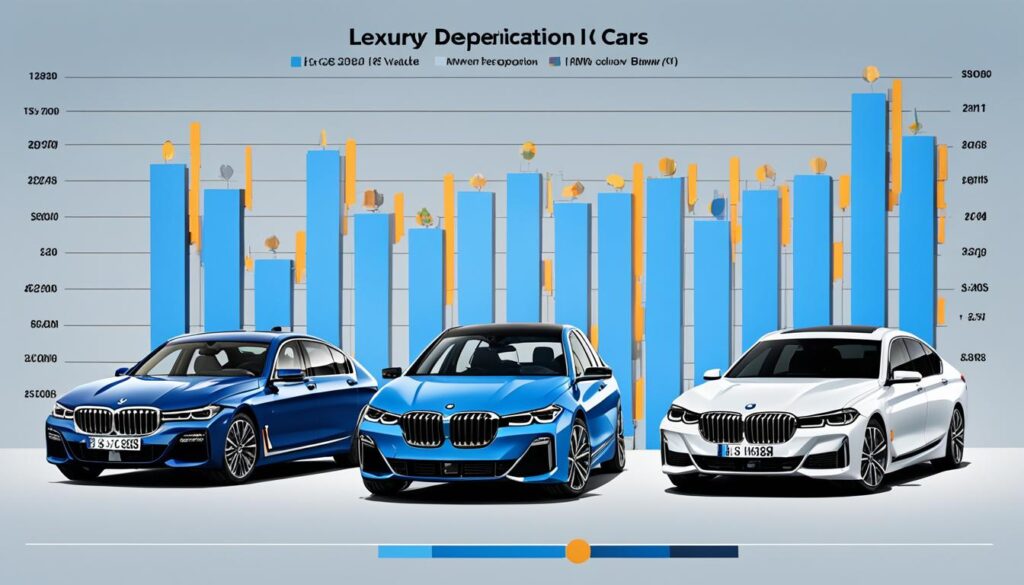
BMW i7 vs. Mercedes-Benz S-Class: A Depreciation Showdown
The depreciation of a luxury vehicle is a nuanced narrative, woven with threads of opulence and cutting-edge technology. The BMW i7, entering the market with an ambitious proposition, faces the benchmark of Mercedes-Benz S-Class depreciation—a standard that has defined luxury car value over the years. By placing these two titans side by side, we gain insight into their appeal in the high-end secondary market and how it influences their inevitable depreciation curve.
Renowned for setting the bar high, the Mercedes-Benz S-Class carries a history of refined luxury combined with technological prowess, making it a relevant standard when assessing the depreciation impact on the BMW i7. Mercedes-Benz has managed to maintain an admirable level of value retention owing to its consistent demand and status symbol. Yet, the BMW i7 seeks to redefine expectations, harnessing electric vehicle appeal to possibly alter its depreciation trajectory.
BMW 7 Series: Does Historical Prestige Translate to Value Retention?
The conversation inevitably leads us back through the years to the lineage of the BMW 7 Series. Historical prestige and the marquee’s status have been perceived as influencing factors in luxury car value retention. Yet, it is the contemporary allure of the BMW i7 and its embodiment of modern luxury that truly test whether the past’s legacy can bolster the future’s value.
Amidst the luxury car segment, the examination of luxury car value retention becomes all the more poignant when looking at the forecasts for the BMW i7, against the backdrop of a rich heritage that the 7 Series has carved out in the annals of automotive greatness. This retrospective gives us leverage in predicting the potential of the i7 to uphold or even surpass the value retention of its storied precursors.
Depreciation is an inevitability, reflective of its own realm of luxury autonomy. It’s crucial for aficionados and investors alike to scrutinize the BMW 7 Series’ past and present, juxtaposing it with competitors like the Mercedes-Benz S-Class, to decode the mysteries of depreciation—foretelling the standing of the BMW i7 in a competitive luxury car marketplace.
Evaluating the BMW i7’s Resale Market
As the BMW i7 enters the fray of the second-hand luxury market, its performance on the scale of depreciation becomes a hot topic for stakeholders and enthusiasts alike. This behavior, closely tied to the vehicle’s features, branding, and the industry’s current trajectory, calls for a keen analysis of its expected resale value. Here, we dissect the intricate layers of BMW i7’s resale expectancy and position within the fluid dynamics of luxury vehicle ownership life cycle.
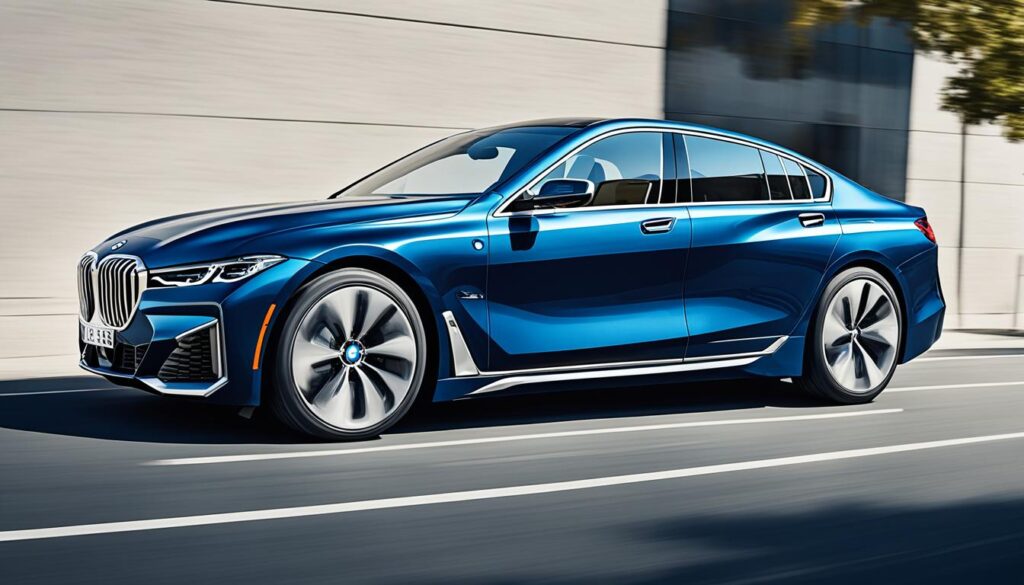
The Role of the Second-Hand Luxury Market
The second-hand luxury market is a crucial determinant of a luxury vehicle’s afterlife. A car’s success within this market segment rests on aspects such as the brand’s prestige, the model’s popularity, and overall market health. The BMW i7, bearing the torch of its venerable 7 Series lineage, is viewed with expectation. Will it thrive or succumb within this highly competitive resale arena?
Predicting the BMW i7’s Value Over Time
Akin to the delicate game of chess, predicting the BMW i7’s value over time involves strategic consideration of various factors. These include economic conditions, technological relevance, and changing consumer sentiments towards electric vehicles. Market analysis aims not just to forecast the future but to underline patterns that could dictate the BMW i7’s standing amongst its rivals in the second-hand luxury market.
Anticipating the BMW i7’s depreciation trajectory is as much about assessing where it stands today as it is about examining how second-hand luxury vehicles have historically been valued across diverse markets and times.
Technological Advances vs. Value Retention
At the epicenter of modern luxury vehicles is a burgeoning debate: Do the advanced technological features of models like the BMW i7 equate to a better value retention over time? In an industry where luxury electric vehicle innovation is accelerating at breakneck speed, these tech-savvy amenities may be double-edged swords, enticing buyers with the plush comforts of tomorrow while threatening to outdate themselves in the wake of newer developments.
Does High-Tech Equal High Value?
For discerning customers, the allure of the BMW i7 is not merely its emblematic badge or its silent, electric glide. It’s the BMW i7 technological features that promise an immersive experience akin to a digital renaissance on wheels. The premier luxury vehicle boasts an array of tech provisions designed to amalgamate indulgence with innovation. Yet, the pivotal question remains—does this high-tech arsenal promise greater desirability in the competitive resale market, or does it prompt earlier obsolescence, thereby accelerating depreciation?
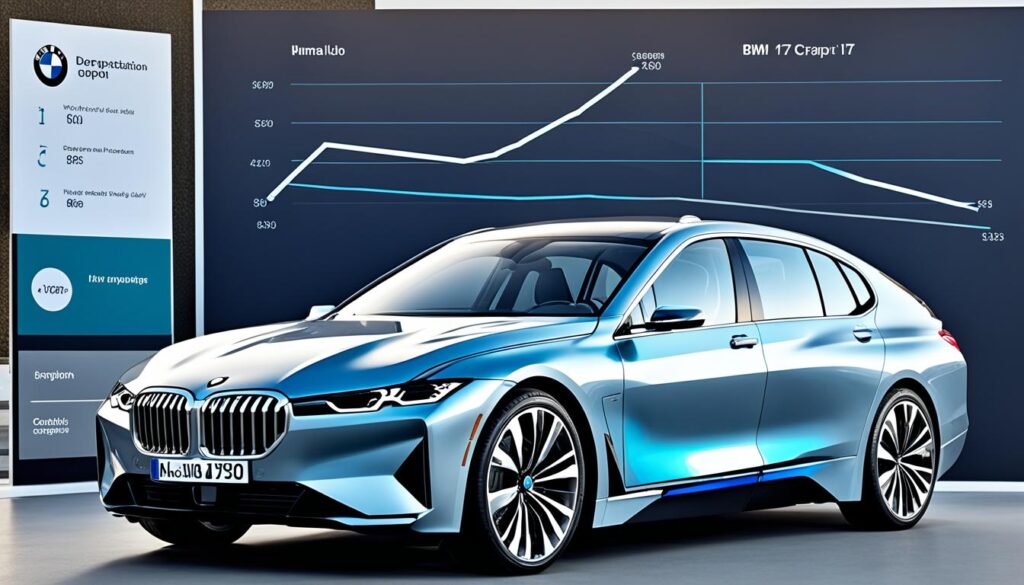
iDrive and Digital Innovations: Enhancing or Detracting Value?
The heart of the debate often beats loudest within the circuitry of systems like the renowned BMW iDrive infotainment system. This digital maestro represents a salient feature under the lush canopy of the i7’s technological forest. With its intuitive operation that eclipses competitors and a seamless integration of entertainment, navigation, and vehicle controls, it poses as a formidable asset in the luxury sedan’s armory. Yet, apprehensions linger over its potential contribution to the value retention of the BMW i7, as the rapid evolution of tech may render today’s marvels into tomorrow’s antiquities.
As industry observers and potential buyers behold the BMW i7—a constellation of luxury electric vehicle innovation—the true measure of its worth over time will only be illuminated through the complex interplay of technological vanguardism and perennial value. It’s this delicate balance that will eventually map out the depreciation or appreciation trajectory of this electric paragon.
Understanding the BMW i7’s Position in the Current Market
As the tides of the automobile industry shift and evolve, the BMW i7 emerges as a defining paradigm within the luxury electric car sector. Grasping its market standing requires an in-depth examination of current market trends, economic fluctuations, and the critical fallout from global events such as the pandemic. These elements coalesce to sculpt the depreciation rate of this prestigious vehicle, a matter of paramount interest to consumers and analysts alike. By probing into these aspects, we garner a nuanced comprehension of the BMW i7’s value trajectory in an environment marked by unpredictability and innovation.
Market Trends Affecting BMW i7 Depreciation Rate
Recent market trends in the luxury car sector reveal a complex narrative that directly impacts the depreciation rate of vehicles like the BMW i7. Consumer inclinations towards electric vehicles continue to rise, yet luxury models face unique challenges in value retention. Compounding this is the rate at which technology progresses, often rendering last year’s innovations obsolete and affecting resale values. The intricate dance between innovation, consumer demand, and market saturation underscores the compelling story of the BMW i7’s depreciation rate within the current landscape.
Pandemic and Its Impact on Luxury Car Values
The onset of the pandemic has undeniably reshaped the luxury car market, introducing volatility and recalibrating consumer behavior globally. For the BMW i7, this has meant navigating through a period of market analysis that must counterbalance the scales of luxury demand against economic uncertainty. The pandemic’s impact has stretched consumer budgets and shifted priorities, which, paired with changes in mobility patterns, have left an indelible mark on luxury car depreciation rates, compelling industry experts to reconsider the factors that govern value over time.
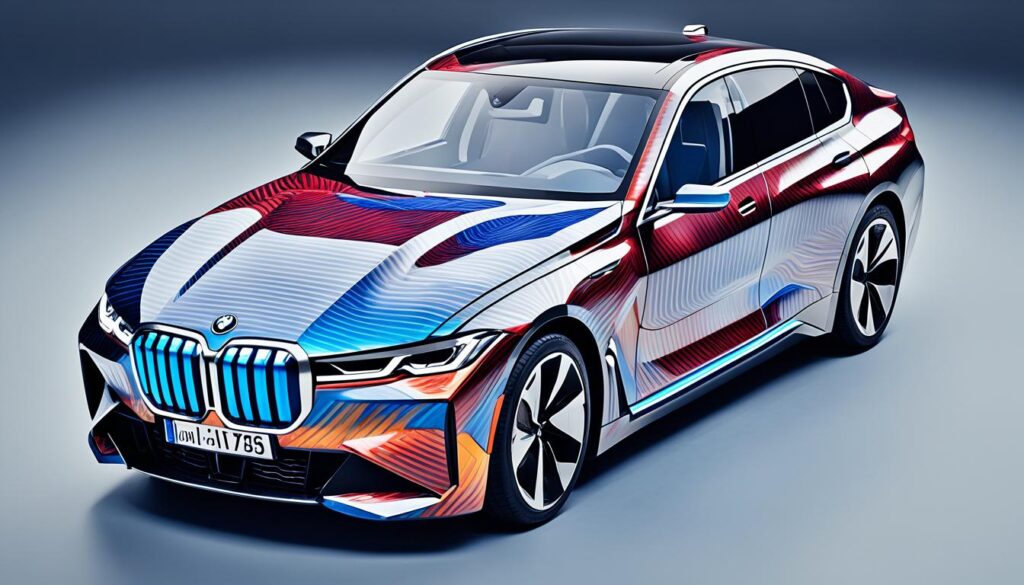
Here is a table detailing some of the key factors influencing the BMW i7 depreciation rate in the current market:
| Factor | Description | Influence on BMW i7 Depreciation Rate |
|---|---|---|
| Technological Prowess | The rapid rate of electric vehicle technology advancements. | EV innovations continue to accelerate, potentially outdating previous models faster, influencing consumer interest, and directly affecting the i7’s depreciation rate. |
| Economic Volatility | Fluctuations in the economy induced by pandemic ramifications. | Economic uncertainty can suppress luxury spending and alter consumer choices, thereby amplifying the i7’s depreciation rate. |
| Sustainability Trends | Increasing consumer preference for eco-friendly vehicles. | The shift towards sustainable transportation can bolster the BMW i7’s value, potentially mitigating its depreciation rate in an environmentally-conscious market. |
| Market Saturation | The entry of numerous competitors in the luxury EV space. | A crowded market leads to stiffer competition, with the potential to either validate or diminish the i7’s unique selling points, thus impacting its depreciation rate. |
As we dissect these facets, it becomes evident that the BMW i7 is cruising through an economic epoch that will carve its legacy in the history books of the luxury EV market. Continual analysis, attuned to the changing times and trends, remains indispensable in grasping the BMW i7’s position in the ever-contending currents of the current market and its depreciation journey.
The Weight of Luxury: How the i7’s Build Affects Its Depreciation
As the automotive industry continues to innovate with luxury vehicles that accommodate advanced technology and comfort, the vehicle weight has become a critical aspect in evaluating the cost of ownership. The BMW i7, with its substantial presence, serves as a prime example of this evolution. Weighing in at a notable 5,820 pounds, the i7’s heft is a reflection of its luxury build quality and technological density. This added mass, however, introduces into the conversation the implications for value retention and how future automotive innovations might impact long-term ownership costs and overall depreciation.
Heavier Luxury Cars: The Trade-Off Between Comfort and Cost
The allure of luxury vehicles lies in their exceptional build and the promise of ultimate comfort. This inevitably entails added weight due to high-end materials and amenities. The BMW i7 is no exception, offering a cabin laced with premium features that collectively contribute to its significant mass. While this ensures a serene and sumptuous driving experience, it also raises questions about the resultant cost of ownership. Heavier vehicles typically require more robust components, which can lead to increased maintenance expenses over time. Additionally, as vehicle weight escalates, so too does the potential for higher fuel consumption, even in the case of electric vehicles where weight influences battery efficiency. Such factors play integral roles in the anticipated depreciation, especially as more svelte and efficient models enter the market.
Future Innovations That May Influence Value Retention
The relentless pace of future automotive innovations is set to challenge our current perceptions of luxury car ownership. Developments in battery technology are especially pertinent, with the promise of more energy-dense solutions that may offer the same power in lighter packages. Additionally, advancements like active noise cancellation and the incorporation of a vehicle’s architecture into its audio system could see the subtraction of hefty components, further aiding in the reduction of vehicle weight. These innovations, among others, will likely play a significant part in shaping the value retention profile of luxury electric vehicles like the BMW i7. With an industry moving towards a more sustainable and efficient future, also echoed by consumer preferences, the impact that the luxury build and its associated weight has on depreciation is an intriguing subject that will continue to evolve alongside automotive technologies.
Expert Insights on BMW i7 Depreciation Analysis
Investigating the depreciation of the BMW i7 is more than an exercise in number-crunching; it is a deep dive into the multifaceted dynamics of luxury electric vehicle ownership. To bring clarity to the BMW i7’s long-term value, we have gathered expert insights and dissected a wealth of data to outline depreciation patterns that help shape the future of automotive investments.
Industry Perspectives on i7’s Long-Term Value
Industry analysis delves into a spectrum of factors when evaluating the long-term value of a premium electric vehicle like the BMW i7. From initial quality to innovation longevity and market perception, experts consider complex variables that not only influence immediate resale price but also determine the standing of a vehicle years down the line. These informed perspectives are critical in creating a comprehensive understanding of where the BMW i7 stands among its peers.
Collecting Data: Understanding Depreciation Patterns
Real-world data collection and analysis form the backbone of any substantial depreciation analysis. For vehicles like the BMW i7, historical and current market trends are scrutinized to unveil depreciation patterns unique to the model. What emerges is an insightful narrative that offers predictive value, revealing how external market forces and internal vehicle attributes interact to define the BMW i7’s economic journey through its ownership lifecycle.
| Year | Depreciation Rate | Market Influences |
|---|---|---|
| 1 | 20% | Initial off-the-lot depreciation |
| 2-3 | 15% annually | Stabilization period, influenced by industry acclaim and consumer reviews |
| 4-5 | 10% annually | Continued tech relevance and maintenance costs start influencing resale value |
| 6+ | Varies | Dependent on market’s evolution, popularity of EVs, and emergent technologies |
By sifting through expert analyses and persistently updating our dataset, the BMW i7 long-term value begins to come into better focus, offering stakeholders a lens through which to gauge potential risks and rewards associated with luxury electric car ownership and resale.
Conclusion
As we summarize the insights gathered from our extensive BMW i7 depreciation analysis, it becomes clear that the narrative of luxury electric car ownership is one marked by nuance and complexity. This final contemplation integrates various strands of data and observations, culminating in a decisive perspective on the i7’s value trajectory. By considering factors such as innovation, market trends, and the heavyweight of luxury build, owners are equipped with a comprehensive understanding of the economic lifespan of this paradigmatic vehicle.
Synthesizing BMW i7 Depreciation Data
The thorough examination of the BMW i7’s depreciation sheds light on a multifaceted phenomenon influenced by immediate market forces and longer-term technological advancements. As luxury electric cars like the i7 transition from novel to normalized in the automotive landscape, their depreciation patterns reflect broader industry shifts. Understanding this depreciation through granular analysis offers owners and potential buyers a valuable foresight into the market, enhancing the decision-making process for current and future investments.
Future Prospects for BMW i7 Owners
When looking towards the future projections of luxury electric car ownership, the BMW i7 appears poised for an intriguing journey that melds tradition with modernity. As technology forges ahead, and as sustainability becomes more than a catchphrase but a pivotal buying factor, the landscape for high-end EVs will continue to adapt. Prospective and current BMW i7 owners may find this evolution holds promise for better value retention than seen in conventional luxury sedans, pivoting on the i7’s unique position within a rapidly transforming market. The onus lies in continual awareness and strategic foresight to gauge the longevity of luxury, electrified.
FAQ
What factors contribute to the BMW i7’s depreciation rate?
The BMW i7’s depreciation is influenced by various factors such as technological advancements, luxury features, the broader trends in luxury EV market depreciation, competition with other luxury brands, second-hand market demand, and economic conditions.
How does the BMW i7’s resale value compare to the luxury EV market?
The BMW i7’s resale value is determined in the context of the luxury EV market, which tends to experience significant depreciation. While exact comparisons will emerge over time as more real-world data becomes available, historical trends of the BMW 7 Series suggest notable depreciation, which the i7 will look to improve upon with its innovative features and electric powertrain.
Can the legacy of the BMW 7 Series impact the i7’s value retention?
The legacy of the BMW 7 Series may have both positive and negative impacts on the i7’s value retention. Prestige and brand equity might contribute to higher residual values, but historical depreciation patterns of the Series can also influence market expectations for the i7’s depreciation.
Are luxury features like Merino leather worth the investment for resale value?
Luxury features such as Merino leather or Veganza seating may enhance the initial appeal and potentially command a higher resale value, but they do not necessarily guard against the steep depreciation curve typical in luxury vehicles.
How does the BMW i7 stand against the Mercedes-Benz S-Class in terms of depreciation?
Both the BMW i7 and Mercedes-Benz S-Class are high-end luxury vehicles that typically face significant depreciation. Direct comparisons will need to take into account various model years, market preferences, and technological features to determine how they stack up against each other in depreciation rates.
What is the anticipated second-hand market performance of the BMW i7?
The BMW i7’s performance in the second-hand market will largely depend on market reception, technological relevance, and maintenance of luxury features over time. While precise predictions are challenging, the second-hand market will ultimately reflect the desirability and perceived value of the BMW i7 as it matures.
Do technological advancements in the BMW i7 equate to better value retention?
Technological advancements can be a double-edged sword in value retention. While they may enhance the initial appeal of the BMW i7, rapidly changing technology can also date a vehicle more quickly. The true impact of iDrive and other digital innovations on the i7’s value retention will become more apparent over time as newer technologies emerge.
How do current economic trends affect the BMW i7’s depreciation rate?
Economic trends can significantly affect the BMW i7’s depreciation rate. Factors such as consumer purchasing power, interest rates, and overall economic health all play a role in determining luxury vehicle demand and, consequently, resale value.
How might the BMW i7’s larger weight impact its depreciation over time?
A heavier build can impact a vehicle’s efficiency and performance, and these factors may contribute to the depreciation of a luxury vehicle like the BMW i7. Future advancements in technology and energy efficiency, however, could alter the current perceptions and impact of vehicle weight on depreciation.
What long-term value prospects do industry experts see for the BMW i7?
Industry experts generally recognize that luxury vehicles face significant depreciation, but some suggest the BMW i7’s electric drivetrain and advanced technology could bolster its long-term value. However, it will largely depend on how it stands up to future market trends and technological developments.
How can the collected depreciation data of the BMW i7 provide insights for future owners?
Depreciation data gives current and future BMW i7 owners an understanding of the vehicle’s anticipated market value over time. This information can help them make informed decisions regarding purchasing, owning, and selling timeframes to maximize value retention.
